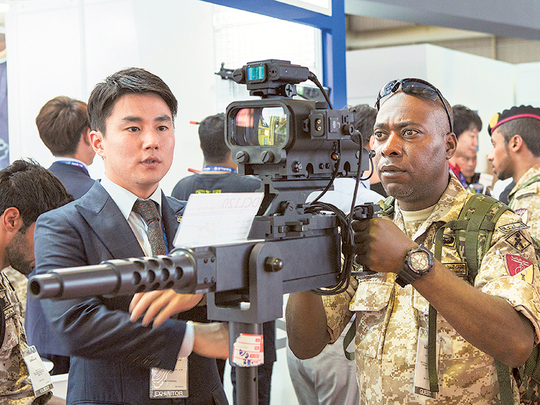
Dubai: Saudi Arabia on Monday made the surprising announcement that it plans to increase its military spending within the country from 2 to 50 per cent by 2030. It’s a plan that looks ambitious and challenging, and would require a massive build-up in the country’s industrial manufacturing capacity.
Despite a large number of sceptics, analysts in the country say it is possible.
“It is doable,” said Somayya Jabarti, editor-in-chief of the Saudi Gazette English-language newspaper, who became in 2014 the first Saudi woman to reach such a position.
“Is it optimism that it is doable in the next 15 years or it is a realistic? I think given the pace things are going on right now, and given the pace the deputy Crown Prince [Prince Mohammad Bin Salman works at] and the way he works, it is achievable. With this momentum, with this pace, it is achievable,” she told Gulf News.
Prince Mohammad, 31, who is also the Saudi defence minister and chairperson of the Council for Economic and Development Affairs, announced the plans to increase the military manufacturing sector on Monday as part “Saudi Vision 2030,” which is considered the future development plan for the oil-rich country’s move away from an oil economy.
Saudi Arabia is already the third-largest spender in the world on military.
According to International Institute for Strategic Studies, Saudi Arabia’s military spending was $81.8 billion (Dh300 billion) in 2015, and constituted nearly 12.9 per cent of the country’s GDP.
Benefits of “localising our own defence industries are not limited to solely reducing military spending. It also stimulates other industrial sectors such as industrial equipment, communications and information technology, which in turn creates more job opportunities,” according to the Vision’s text that was published by Saudi media. The national defence industrial sector is limited to only seven companies and two research centers.
Already the work to develop less complex industries such as those providing spare parts, armoured vehicles and basic ammunition has started, the government said.
Jeddah-based Saudi political scientist Waheed Hamza Hashem said the plan is feasible.
“It is achievable if there was a real political will, and yes the will is there. It is achievable if there is a spending capability, and Saudi Arabia has this capability,” he told Gulf News.
However, the kingdom needs to focus on developing the needed human power in the next five or ten years to achieve the goal.
“I hope developing military industries will reflect on the civil/traditional industries. We as a country import and consume almost everything, and it preferable if we enter the industrial era and start making cars, motorcycles, machines and other equipments…”, he said.
“We also need to localise the technical talents in our country,” and “to develop the research, development and application centres,” Hashem added.
Meanwhile, other experts believe bringing in the know-how is one of the important keys to meeting the Saudi goal.
“Saudi Arabia has two challenges. First is the technology transfer from the countries that have it, and this is not an easy task,” said Riad Kahwaji, Founder and CEO of the Dubai-based Institute for Near East and Gulf Military Analysis (INEGMA). Technology and software constitute the backbone of western military industries, Kahwaji added.
In addition, the kingdom needs to have “the human power and qualified labour to absorb the technology and develop it,” he told Gulf News.
“The period of 15 years is a good [enough] one, and you can start from today,” Kahwaji said, explaining that high school students can be directed to join certain colleges and specialisations such as IT, areo-space and cyber security.
Saudi Arabia is expected to adopt the successful UAE schemes of offsets, which allocates a percentage of the value of a contract back into the national economy and joint ventures. The Kingdom has already started to implement the offset system and generate billions of dollars from recent military deals, he said.
Currently, the UAE comes at the top of the Arab countries in terms of high-tech military industries, while Egypt tops the list of Arab countries producing mechanical and military products. Jordan is also high on the list of Arab countries with military industries, Kahwaji pointed out.











